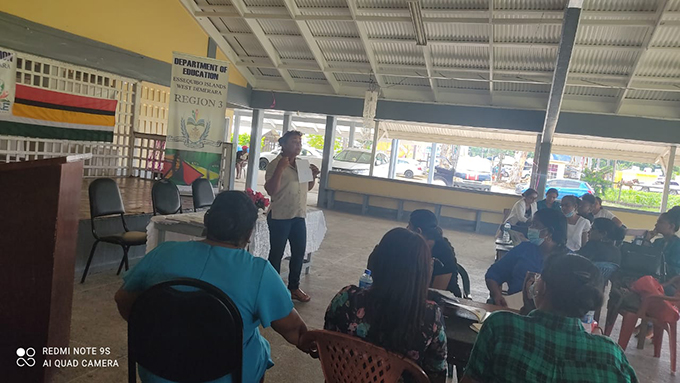Venezuelan immigrants along with Indigenous children can now benefit from English as a Second language (ESL) classes to aid their integration into the education system.
The MoE on Wednesday informed that the ministry’s Disaster Risk Prevention and Migrant Support Unit had recently concluded a two-day ESL capacity-building workshop in Region Three, with the attendance of 28 teachers from 18 schools in regions Three, and Seven.
As part of its efforts to eliminate the language barriers, the release stated, the MoE has introduced ESL training for its teachers. This, it noted, will equip teachers with the requisite skills to support migrant learners and to provide linguistic support to returning Guyanese, Venezuelan and indigenous children through English as a Second language (ESL) classes to aid their integration into the education system.
According to the release, ESL is normally taught to students whose primary language is not English, in order to improve their English speaking, reading, writing, and listening skills.
Coordinator of the Risk Management and Migrant Support Unit, Rampattie Prashad-Bisnauth, noted that the MoE recognises the “disparity” between migrant children and the lack of ESL support in some schools. “Therefore, in keeping with the 2030 Vision for the education sector – providing opportunities for quality, equitable education and lifelong learning for all, the Ministry has been working to reduce the disparities for migrant learners by promoting the inclusion of all school-aged migrant children in Guyana’s education system and ensure that migrants have equitable access to education regardless of their legal status, nationality, or citizenship in keeping with international standards.”
She explained that the training session is one of many that will be rolled out to provide a more inclusive, sustainable, and long-term solution to address challenges faced by non-English speaking children, across the eleven education districts in the country. The coordinator also pointed out that the main focus of the training is to improve the ESL instructional skills of teachers and ultimately provide migrant learners with the necessary support to help them cope with culture shock and daily challenges in and out of school, thereby increasing the probability of a more successful integration process in schools.
At the end of the second day of the initial training exercise, each participating school received six electronic tablets to aid with ESL teaching within the classrooms. These devices have translator apps installed that function without an internet connection. These devices were donated by the United Nations High Commission for Refugees (UNHCR) to aid with the current ESL after-school programme in schools in regions One, Three, and Seven.
The MoE’s Management Information Systems Unit prepared the devices, and they are ready to be used within the schools to aid with the translation of words, text, voice recordings or any other information that needs to be translated into any language, the release added.



